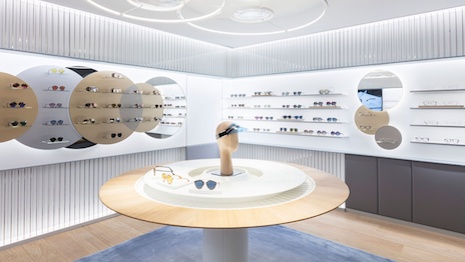- About
- Subscribe Now
- New York,
March 9, 2018

 Luxury brands have already begun expanding eyewear options. Image credit: Dior
Luxury brands have already begun expanding eyewear options. Image credit: Dior
While Ray-Bans are still the king of sunglasses for most U.S. consumers, luxury brands such as Gucci, Michael Kors and Coach are all making significant headwinds among valuable millennial consumers for eyewear.
Sunglasses and eyewear are accessories for which even regularly non-luxury consumers are willing to spend a premium amount. This information comes from a report from MVI Marketing, which found that a significant percentage of U.S. consumers are willing to spend more than $300 or even $500 on sunglasses.
“In this study we asked wealthy, younger, male and female consumers in the USA, to pick their brand favorites in both the sunglass and prescription eyewear categories,” said Liz Chatelain, president of MVI, Austin, TX.
Luxury eyewear
Luxury eyewear as a category has been growing healthily over the last few years.
Brands such as Gucci and Chanel have spent considerable effort focusing on their eyewear categories while online retailers such as Warby Parker and Net-A-Porter have made trying on and purchasing eyewear as simple as can be.
To gauge exactly how consumers feel about luxury eyewear today, MVI surveyed wealthy people who are 25 to 40 years old in the U.S. What they found was that for many, eyewear is something worth spending a lot of money on.
Department stores are the top place to buy luxury eyewear. Image credit: MVI Marketing
While the majority of people prefer to spend between $100 and $299 for glasses, 37 percent of people said they would spend more than $300 and 13 percent they would spend $500 or more.
Surprisingly, specialty eyewear stores were ranked very low on the list of where customers prefer to buy their glasses, with major retail stores and online being far more popular.
Renewed efforts
The willingness for luxury consumers to spend significant amounts on eyewear shows luxury brands that there is still a valuable market for luxury eyewear. Many big names in the luxury world have already begun efforts to emphasize their eyewear options to customers.
French atelier Christian Dior has opened a new space on Paris’ Avenue Montaigne dedicated to its eyewear collections.
Similar to beauty and fragrance, the eyewear category’s accessible price point works as an entry-level introduction to a brand. The Dior eyewear collection, which includes sunglasses as well as optic frames, are a license of Italian eyewear manufacturer Safilo Group, who also produces frames for Fendi, Jimmy Choo and Marc Jacobs, among others (see story).
Eyewear are the second most popular luxury good. Image credit: MVI Marketing
As the luxury industry at large becomes more environmentally friendly, brands will move toward the use of sustainable materials to manufacture goods.
Eyewear is no exception. Brands such as Kering Eyewear, which makes the frames for brands such as Gucci, Bottega Veneta and Saint Laurent, have begun using new materials to make products more sustainable to produce (see story).
These recent trends in the luxury world show that eyewear is still a valuable category and accessories can be a major driver of sales as well as a great way of engaging with customers and building a relationship in-store and not just online.
“Although Warby Parker had a strong showing for retail channel preference, respondents ranked major retail store as their number one choice to purchase prescription eyewear,” MVI's Ms. Chatelain said,
Share your thoughts. Click here